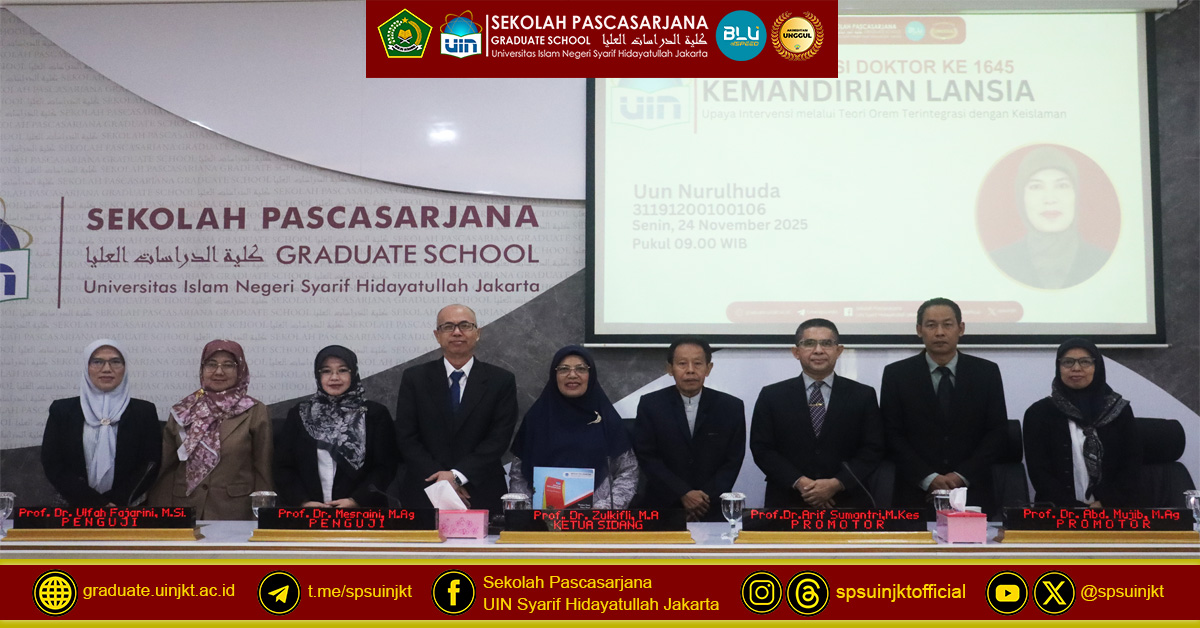Uun Nurulhuda Doctoral Promotion Exam, Elderly Independence Model Based on Orem Theory and Islamic Values
Auditorium of Prof. Dr. Suwito, MA SPs UIN Jakarta, SPs NEWS - The Graduate School (SPs) of UIN Syarif Hidayatullah Jakarta held the 1645th Doctoral Promotion Exam in the Auditorium Room of Prof. Dr. Suwito, MA on Monday, September 24, 2025 with the promovenda Uun Nurulhuda.
Uun is a student of the Doctoral program in Islamic Studies with a Concentration in Religion and Health. Uun wrote a dissertation titled "Independence of the Elderly: Intervention Efforts through Orem Theory Integrated with Islam"
Independence has long been the main indicator for assessing the quality of life of the elderly. However, the inevitable decline in physical, psychological, social, and spiritual function is often a serious obstacle. This condition hinders the ability of the elderly to do self-care, meet basic needs, and even carry out important spiritual activities in preparing husnul khotimah at the end of life.
Responding to this challenge, Uun's research aims to analyze the application of Self-care Theory (Orem) which is harmoniously juxtaposed with Islamic values. The main goal is to develop an integrated theory-based intervention model to effectively increase the independence of the elderly.
This study adopts the Mixed Method Sequential Explanatory approach, a combination of quantitative and qualitative methods. The research population includes the elderly from several institutions, namely PSTW Ria Pembangunan Cibubur, Islamic Center Tangerang, and Hasa Sunter Home in North Jakarta. A total of 140 elderly people were involved in a quantitative sample, supported by qualitative data from primary and secondary sources to enrich the findings.
The results of the quantitative analysis showed that the three dimensions of self-care had a very significant influence on the independence of the elderly. The physical (p = 0.000), psychological (p = 0.002), and social (p = 0.014) dimensions all played a crucial role. These findings confirm that the ability to maintain health, emotional balance, and social support are determining factors for the elderly to be able to live independently.
The spirituality aspect emerged as a transformative key finding. Spirituality plays a significant role as a mediator in all three dimensions of self-care, showing a strong indirect influence on physical (p = 0.006), psychological (p = 0.010), and social (p = 0.027) aspects. Self-care activities based on spiritual awareness have been proven to strengthen the meaning of life and arouse the spirit of the elderly to remain independent.
Furthermore, spirituality also showed a significant direct influence on the independence of the elderly (p = 0.000). This number confirms the hypothesis that closeness to God is not just a complement, but the main and irreplaceable foundation in maintaining the independence of the elderly as a whole.
Qualitative findings strengthen statistical data, showing that routine worship practices such as prayer, prayer, and dhikr, as well as the appreciation of the values of tawakal and patience, are an essential source of psychological strengthening. These religious practices help the elderly to stay meaningful and connected, overcoming the psychological challenges of aging.
One of the important conclusions of this dissertation is the rejection of the idea that technology can completely replace the role of spiritual and psychological interaction that the elderly so desperately need. This humanist-spiritual approach has proven to be more in line with the culture and spirituality of Indonesian society.
This study concludes that increasing the independence of the elderly becomes effective through a nursing approach that integrates spiritual aspects and Islamic values, supporting the relevance of the Self-care Deficit Theory. This dissertation recommends the development of an elderly nursing intervention model that integrates clinical, cultural, and religious aspects holistically as a step forward to improve the quality of elderly services in Indonesia.
This dissertation is expected to be an important guide for nurses, nursing home managers, and families in providing care that not only touches the physical, but also the soul and spirituality of the elderly, for the sake of achieving independence and husnul khotimah.
Uun Nurulhuda successfully defended his dissertation under the guidance of Prof. Dr. Arif Sumantri, M.Kes and Prof. Dr. Abdul Mujib, M.Ag, M.Si, and was tested in front of a board of examiners consisting of Prof. Dr. Zulkifli, MA, Prof. Dr. Arif Sumantri, M.Kes, Prof. Dr. Abdul Mujib, M.Ag, M.Si, Prof. Hoirun Nisa, M.Kes, Ph.D, Prof. Dr. Ulfah Fajarini, M.Si and Prof. Dr. Mesraini, M.Ag.
After paying attention to the dissertation writing, the comments of the examiner team and the promovenda's answers, the examiner team determined that Uun Nurulhuda graduated with the title of Very Satisfactory. Uun Nurulhuda is the 1645th Doctor in the field of Islamic Studies, in the doctoral program of the Graduate School of UIN Syarif Hidayatullah Jakarta. (YES)

